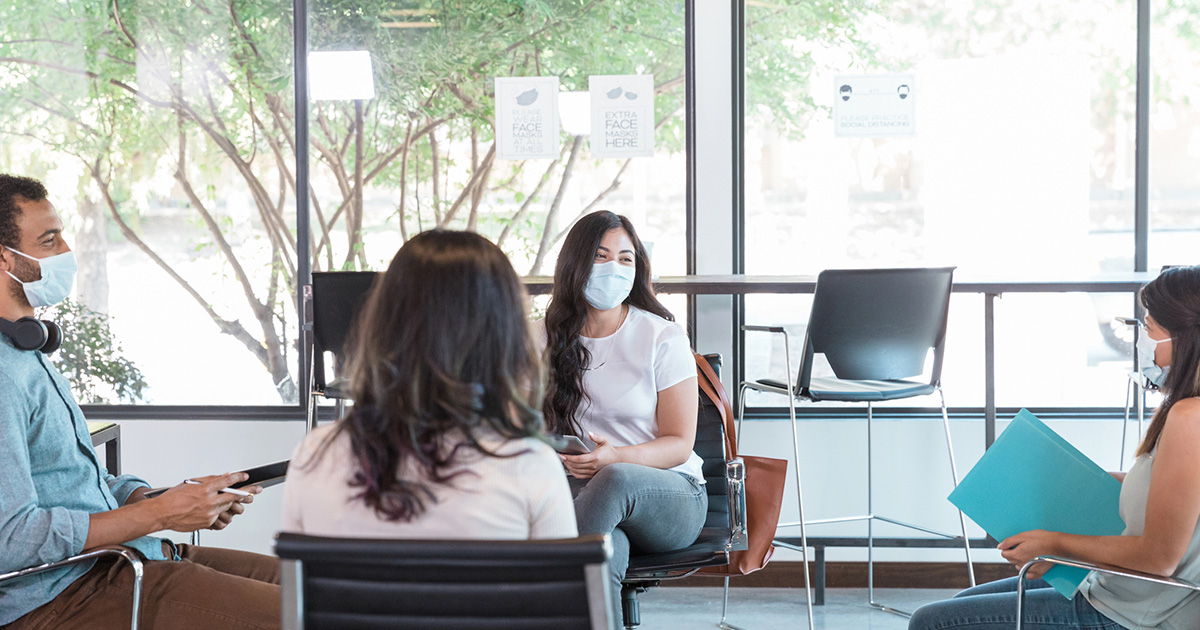 Photo From Getty images
Photo From Getty images
Originally Posted On: Group Therapy Healing Benefits for Mental Health Treatment (sageclinic.org)
When you hear “group therapy”, what goes through your mind? Perhaps a movie scene where a character stands up in an AA meeting and says, “Hi, I’m (insert name here) and I’m an alcoholic.”
Group therapy is pretty well known in the context of substance abuse disorder. This normalization of support groups for those who struggle with addiction is great. But did you know that group therapy can be beneficial for other types of support? Group therapy is great for behavioral health in general. For example, here at Sage, we have a:
- Behavioral Health Intensive Outpatient Program
- Adolescent Behavioral Health Intensive Outpatient Program
- Seeking Safety Group
All in addition to our Substance Use Disorder Intensive Outpatient Treatment Program (SUDS IOP). While it might not feel ideal to open up to strangers, we’ve found it can actually be tremendously helpful for your mental health
Understanding The Group Dynamic in Behavioral Health Programs
 Photo From Getty images
Photo From Getty images
When one is going through any type of mental healing, a group environment can be one of the most beneficial modalities to foster a better recovery. In group therapy settings, group members report that going through the process of healing with others can help make them reflect on their trauma from a new perspective. During sessions, people in the group can lift each other up and help one another make progress. In a group therapy setting, yeah you’re going to therapy to get better for yourself, but you also have people there to hold you accountable and remind you of your goals. With group therapy, you are not alone physically, nor mentally.
Most group members share their related experiences with one another to establish connections and trust with their peers. A deeper trust in the group allows one to share more and go farther in the journey. Trust leads to vulnerability. Some vulnerability, some self-awareness, and some support make a delicious progress cocktail. Group therapy environments are a safe space for people to learn, share, and grow. The more you share, the better your feedback will be. When you see others open up about the symptoms they’re experiencing, you can see that your condition is normal and other people go through what you go through every day. Witnessing representations of others dealing with your same struggles, the exposure to new ideas can teach you coping strategies used by those people.

Some people lack a natural support group in their life. Either their friends have drifted away from them or maybe their family turned a blind eye to their circumstance. This feeling of isolation can propel someone struggling with substance abuse or mental illness deeper into turmoil. A new support system born out of group therapy brings a level of accountability into the lives of group members. The success they see from the people around them aids in the development of feelings of hopefulness. It’s a lot easier for someone coming from an objective place to see the truth for someone else. This insight that another group member may give you could be life-changing.
Funny enough, meeting in a group can often teach you a lot about yourself. Hearing feedback from your peers can help you look inward from a new place. Not only does it help you learn about yourself, but group therapy can help with social skills. Some people need more practice in this area of everyday life and group therapy can help you come out of your shell. If you are anxious, engaging with a group of people who know exactly how you feel might make it easier to interact without panic. Active listening and mindfulness during group meetings can encourage you to become a more compassionate, empathetic individual as it allows you to listen to others’ stories.
Sometimes you also just need that little kick-in-the-rear to get started on something. Group therapy can give you the motivation to keep getting better, to continue your journey to sobriety, or continue coping with whatever disorder(s) you have.
There are different groups for different needs. There are anger management groups, weight loss groups, groups for victims of domestic violence, and support groups for grief. Substance Use Disorder Groups
Photo From Getty images
Trying to recover from an addiction is a difficult and often lonely process. Most people in your life probably won’t understand exactly what you’re going through. That’s where group support comes in! Consistently meeting up with people who share your struggle can give you the encouragement to continue being clean or sober. Group therapy sessions offer structure and accountability. One way to stay on track is to have a set routine that prevents you from falling back into old habits. Group therapy can be the first step to that. In a substance use disorder intensive outpatient program, the facilitator will teach you skills and coping mechanisms to aid in your recovery and prevent relapses.
The SUDS IOP we have here in Albuquerque is made to serve those who struggle with addiction. The program is offered in an outpatient setting for those that don’t require inpatient care. This allows for a bit more flexibility in your schedule. If you’re interested in the program, the process begins with an evaluation to craft a unique intensive outpatient treatment program that is individualized and optimized just for you.
In the years since the establishment of our intensive outpatient programs, patients and researchers have validated the success of this type of substance abuse treatment. Realizing the positive impact you’re making by showing up to group sessions can bring value to your life. Most people who give one-hundred percent in group sessions and continue to show up reported having better results over conventional individual therapy sessions. In most circumstances, group therapy can be found for no charge being hosted by qualified caregivers who feel a deep need and want for people to know that there is hope to be found out there.
Behavioral Health Recovery Groups
Photo From Getty images
For many people struggling with severe or long term mental health conditions, once-a-week therapy just isn’t enough. Behavioral health intensive outpatient programs serve to fill in this need gap. BHIOPs offer critical support for many mental health issues and help group members develop skills to help them overcome symptoms and improve their quality of life.
Both Adult and Adolescent Behavioral Health Intensive Outpatient Programs are designed for anyone struggling with serious mental health issues like Depression, Anxiety, Schizophrenia, Bipolar Disorder, or the effects of trauma. Someone who has recently been discharged from psychiatric hospitalization and need step down services would greatly benefit from an IOP. It’s also a good next step program for anyone who has just completed an inpatient program for mental health. Returning back to regular life and returning to old habits can be overwhelming and extra support can help with the transition. In an IOP, patients develop new practical skills and coping mechanisms that can help reduce their mental health symptoms and help them lead a more fulfilling life.
Getting The Most Out of Group Therapy
 Photo From Getty images
Photo From Getty images
The most important thing you can do while attending group sessions is to show up and participate. Take the opportunity to engage with group members. Don’t be afraid to let your guard down. Take it day by day- you don’t have to spill your guts out on the first day. Just keep an open mind and be willing to grow. Think about how sharing your experiences might help someone else. Stick with it even if it gets difficult. You are doing this for yourself. You’re doing this for a better quality of life.
Group therapy sessions bring a sense of community to someone who has felt like an outsider or cannot connect with people on a level that brings them satisfaction and healing to their life. Human connection is something in which we all desperately need. The benefits of group therapy are learning a specific set of skills to help you regulate your emotions and develop healthy coping mechanisms. Attending group sessions gives you the ability to gain a new perspective and foster gratitude for what you have, or perhaps, what you don’t experience as compared to others. Groups help keep you accountable for reaching your goals. Having a group session scheduled helps you build a daily routine around it. Routine is key to recovery. Group therapy or Intensive Outpatient programs help you to make connections and practice your social skills in a controlled environment. Attending groups can also allow you to help others through sharing your own story and the healthy ways in which you cope with your struggles.
Having a support group can serve as a surrogate community for those who lack support from family and friends. Within a group of individuals struggling with their own mental health or substance use disorders, you have concrete evidence that you are, in fact, not alone. There are people who care about you and want to see you succeed in life; whatever that means to you.
Group Therapy for Behavioral Health in Albuquerque

If you’re considering seeking help for yourself or a loved one and want to learn more about how we use Individual and Group Therapy in our Behavioral Health Services in Albuquerque, keep reading or contact us to learn more.
And, please don’t worry if you think group therapy isn’t enough, we offer medication management, individual therapy, specialty services, as well as integrative primary care to help you or your loved one with all of your needs.

